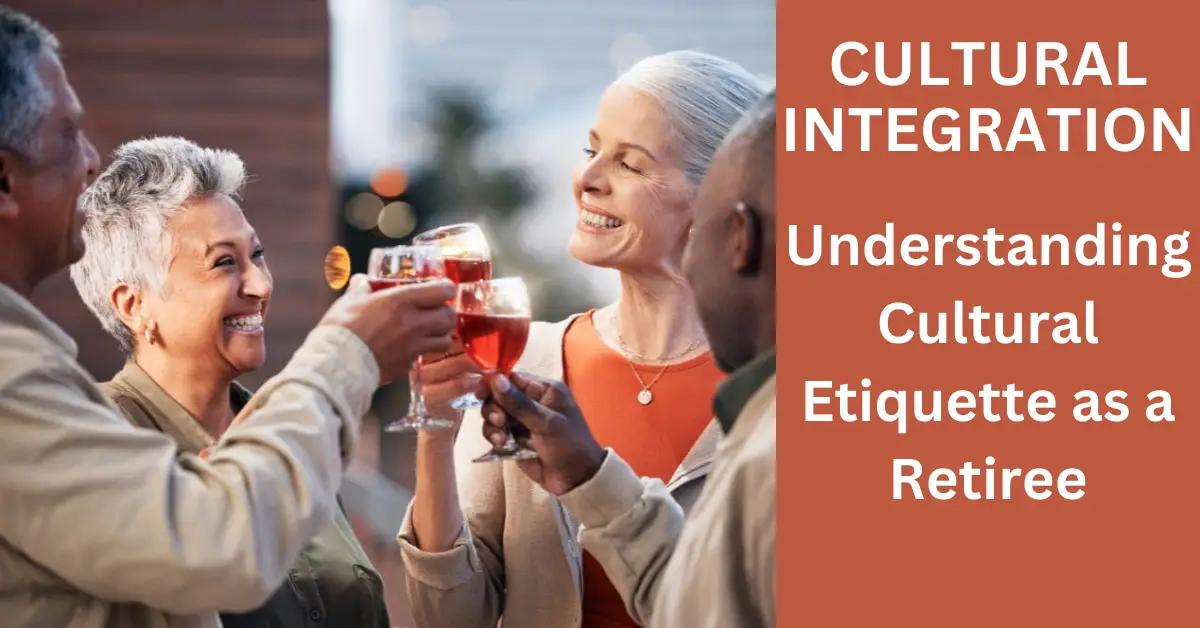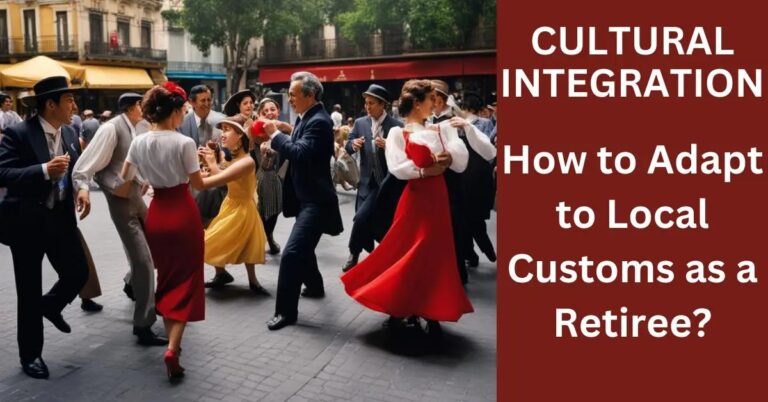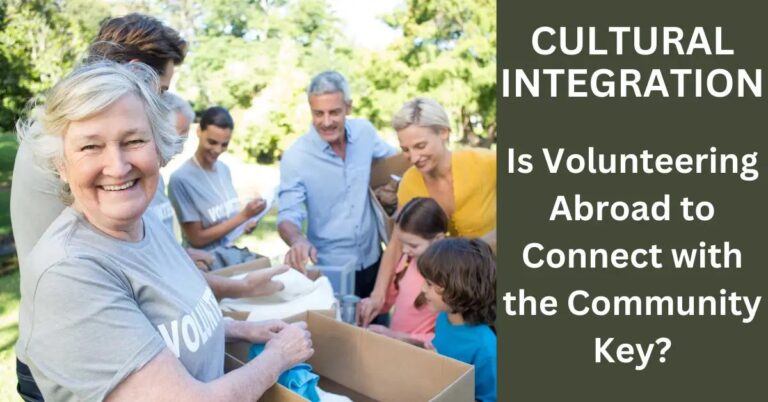TL;DR:
- Understanding cultural etiquette is crucial for retirees traveling or moving abroad to enhance interactions and prevent misunderstandings.
- Key concepts include respect (valuing others’ customs), adaptability (blending with local norms), and communication (kind and clear language).
- Examples: Be quiet in Japanese temples, don’t refuse food in Italy, and learn local greetings.
- Research local traditions before traveling to avoid upsetting locals; immerse by trying foods, attending events, and learning key phrases.
- Engage with locals, respecting attire norms and gestures; what’s normal elsewhere may offend.
- Mistakes are okay; humility and respect foster genuine connections and enriched experiences.
- Consider etiquette workshops to practice and learn new customs.
- Understanding cultural norms enriches retirees’ lives abroad.
Ever wondered why you should care about cultural etiquette as a retiree? Understanding these norms isn’t just polite; it’s essential for a joyful retirement abroad. Whether you’re navigating new neighborhoods or making new friends, cultural norms shape every interaction. Join me, a seasoned expatriate, as we explore how embracing respect, adaptability, and communication can turn cultural hurdles into rewarding experiences. Ready to retire the right way? Let’s dive in!
Understanding Cultural Etiquette as a Retiree: Why Bother?
What is understanding cultural etiquette? It’s knowing how to act properly in different cultures. For retirees, this is key when traveling or moving abroad. It means learning the right way to show respect and understanding.
Cultural etiquette for retirees is important because it helps us fit in. It makes our interactions smoother and more enjoyable. Understanding cultural norms as a retiree can prevent awkward moments. Imagine living or visiting a place and not being in sync with local customs. This can lead to misunderstandings and isolation.
The benefits of understanding cultural norms in retirement are clear. It leads to deeper relationships and richer experiences. You enjoy your time more when you understand what’s expected. It’s about feeling at home in a new culture.
Now, think about some key concepts in retiree etiquette: respect, adaptability, and communication. Respect means showing you value others’ ways. If a culture requires it, remove your shoes when entering a home. Adaptability is blending in with how things are done there. Be open to new eating customs or dress codes. Communication involves clear and kind words, even if there’s a language gap.
Let’s consider some cultural etiquette scenarios for retirees. Suppose you’re in Japan and visiting a temple. Here, being quiet shows respect. In Italy, during a meal, turning down food may seem rude. Think of these like the rules of a game. Knowing the rules makes the game more fun and rewarding.
To understand cultural norms as a retiree, start by learning. Read about your new culture. Watch films from that place. Talk to locals or fellow travelers who have been there. This way, you build your retiree guide to cultural etiquette.
Embracing the local way of life adds to our retirement adventure. It’s about creating a beautiful mosaic from each culture we explore. By understanding cultural etiquette, retirees can live in harmony with the world around them.
How Can Retirees Respect Local Customs and Traditions While Traveling?
When you enter a new culture, you might wonder, “How do retirees respect local customs?” First, research. Learn about local traditions before your journey. It helps avoid mistakes that may upset locals. Get a senior travelers’ guide to local customs. It can steer you to the right path.
Next, adopt strategies for cultural immersion. Try their foods, attend events, and observe traditions. Doing so enriches your journey. You can see the world through different eyes, gaining insight into unique cultures. It makes your travels more meaningful and enjoyable.
Avoiding senior travel cultural faux pas is crucial. Start by using a few key phrases in the local language. A simple “hello” or “thank you” in their tongue can create connections. It shows respect and willingness to engage with locals in their domain. Small efforts make big differences.
Engaging with native cultures helps you learn. Participate in community activities. Shopping at local markets or joining a festival deepens your understanding. Ask questions, but always with politeness. People appreciate genuine interest in their lives and customs.
As a mature traveler, keep etiquette tips in mind. Dress appropriately for cultural sites. Some places have strict rules about attire. Modesty might be important in certain countries, so adapt accordingly. It’s better to be over-prepared than get caught off guard.
Be mindful of gestures and body language. What seems normal to you could mean something else in another culture. For instance, a thumbs-up is positive in some places but not everywhere. Learn these differences to communicate better without unintended messages.
Remember, respect and humility go a long way. Show openness and a desire to learn. Locals will appreciate your efforts even if you make small mistakes. Understanding takes time, but each effort you make can bridge divides. Your travels as a retiree become enriched experiences full of new friendships and stories.
What are some common etiquette tips for retirees adapting to new cultures?
Cultural etiquette can be quite different from what retirees know. Retiree travel advice often suggests that understanding greetings is the first step. How do you greet a retiree? The answer: Every culture has its way. In some countries, you might bow. In others, a firm handshake or even a cheek kiss is more common. It is crucial to research the standard greeting of the place you visit.
Cross-cultural communication for retirees involves more than greetings. Use polite words like “please” and “thank you,” and know if eye contact is okay. Some places see eye contact as rude, while others see it as a sign of honesty. Adapting to these social norms shows respect and helps you fit in with the locals.
Interpersonal skills are vital for international retirees. You should listen more than you speak when learning about others. This practice will give you a chance to pick up clues on what is acceptable. It also shows your eagerness to respect their ways. Cultural respect in retirement living means going along with traditions where you stay. When visiting homes, you might need to remove your shoes. At meals, you might have to wait until the host starts eating.
Some retirees choose etiquette workshops to gain new cultural awareness. These workshops offer lessons that help you know what to do and what to avoid. They also provide a space to practice these new customs before you need them. Adopting these different behaviors can be tough. Yet, they are worthwhile because they help you engage in a new culture mindfully. Understanding these rules makes living overseas or long visits enjoyable.
Mistakes are a part of learning, and nobody expects perfection. As you try to learn and adapt, show you are willing to respect local customs. Whether attending a new friend’s celebration or just walking down the street, every small effort counts.
Conclusion
Understanding cultural etiquette is key for retirees living abroad. Knowing local norms boosts respect, adaptability, and communication. With this guide, you can respect local customs while traveling by learning and immersing yourself in new cultures. Avoid common missteps and engage more with locals. Remember, basic greetings and understanding social norms enrich your experience. Embrace your new community with cultural respect at the forefront. By doing so, your retirement abroad will be more rewarding and connected.












